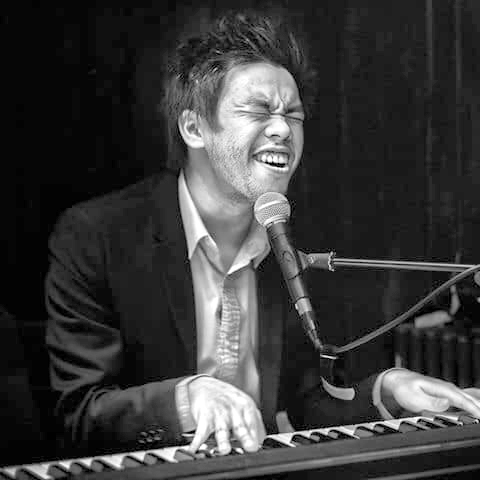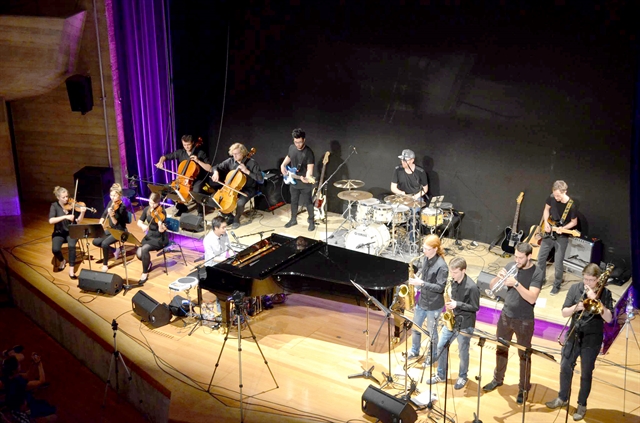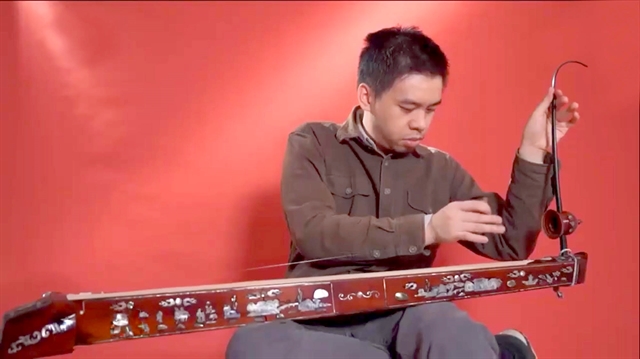
PASSION: Vietnamese German musician-singer Khuất Duy Vinh or Vinh Khuất. Photo courtesy of the artist
Vietnamese traditional music is reaching out into the world with melodies and songs that are going viral, particularly with the younger generation.
Many outstanding songs, including compositions of young artists who have skilfully combined traditional art and history with rap and vibrant electronic music, have touched the hearts of music lovers both at home and abroad.
Among the performers is Khuất Duy Vinh or Vinh Khuất, a Vietnamese-German musician and singer.
Vinh has won prestige on domestic and international stages through his works composed to harmonise jazz with traditional Vietnamese influences.
Neither handsome nor trendy, Vinh is simple and straightforward, but his music feels timeless, the rich melodies charged with genuine emotion.
Born into a musical family in Hà Nội in 1990, Vinh said his grandfather and siblings were musicians, and his mother and uncle both followed their footsteps.
"I am a real chip off the old block," he told Việt Nam News.
Vinh became widely known to domestic audiences after his solo performance at the Sao Mai Gala in 2019 with the song Quá Lâu (Too Long), composed and arranged by himself. The music video was a big hit.

IN THE LIMELIGHT: Vinh (at the piano) performs at a concert in Germany. Photos courtesy of the artist
On the album Tình Đàn (Heaven’s Gourd) by Ngô Hồng Quang launched in early 2021, Vinh and the Đàn Đó group attracted audiences with their distinct melodies and the wonderful rustic sound of the zither fused with traditional instruments such as drums, flutes, and lip lutes.
For Tình Đàn, the scenes in the music video were taken by the Na Hang hydroelectric reservoir in the northern mountain province of Tuyên Quang, which is imbued with the cultural identity of the Tày ethnic minority group -- the inspiration for their work.
Folk and modern music combine
As an overseas Vietnamese artist with outstanding achievements, Vinh has a desire to bring Vietnamese music to the world by combining Western music with the traditional instrumental style.
Vinh has lived in Germany since he was an infant, and graduated from the Hannover Academy of Music with majors in jazz singing and composing.
"I started my first piano lessons with my mother when I was four years old. I have been trained in jazz and pop vocals, classical piano and Latin and jazz. I got a bachelor's in music for vocals and composition in 2016," said Vinh.
"My main style I would consider as pop music, but my major in music at university was jazz, rock, and pop."
Vinh plays music in the style of a "one-man band". He can do all the work of a band, such as arranging, playing piano, saxophone, zither, lute, beatbox, singing and rapping while performing songs, many self-composed.
His songs are mostly in English, German and Vietnamese. The music style selection is exciting, since Vinh's songs have the tone of Vietnamese tradition, with a blend of jazz, rock, reggae and Vietnamese folk music.
"The piano is my indispensable friend. I want to find my own way and to combine traditional instruments such as đàn nhị (two-string fiddle), tam thập lục (36-string zither) and t'rưng (bamboo xylophone)," the overseas Vietnamese artist said.
"My music is a representation of my life, a Vietnamese living in Europe. So, I wanted to incorporate the Vietnamese side with the traditional instruments."
Vinh revealed he first knew of traditional instruments more than 20 years ago.
He was lured into studying Vietnamese traditional instruments in 2001 when meeting a group of Vietnamese musicians on tour to Germany and started to learn the basics from them.
By coincidence, he saw Võ Thuý Hà, a lecturer at the Military Arts and Culture University, playing traditional instruments in Germany during the tour.
Vinh loved the instruments, so asked her to teach him. Later, he learned from her during her tour in Germany and bought instruments to practise. When she returned to Việt Nam, he continued to study online, then played and mixed them into his own music.
He had chances to learn traditional music from Hà since he was about 11 years old.

RISING STAR: Vinh plays as a 'one-man band'. He can do all the work of a band, such as arranging, playing piano, saxophone, zither, lute, beatbox, singing and rapping while performing songs.
Outstanding awards
Vinh is a dynamic young man, always seeking creativity and trying his best to bring passion to his music.
Born talented, with the young passionate heart of a true artist, he wants his music to beat to the sound of his homeland Việt Nam, while inspiring Vietnamese the world over.
He has won many awards in Germany such as the Impressive Contestant, “Young Talent Award” in the Golden Voice 2005, and first prize at the “Made in Schaumburg 2008” competition.
In 2011, he participated in an international competition in Austria with an Acapella group and also won first prize. In 2012, he won two first prizes by judge and audience votes, along with an award for the favourite contestant at the Hannover Songcontes Horen 2012. The list goes on.
Although he is working and living in Germany, every year Vinh spends time returning to Việt Nam to meet and perform his songs for native audiences.
In the Classic And More concert series that opened this month in HCM City and Hà Nội, Vinh offered a mixture of pop and classical music by musicians performing together on stage.
Speaking about his future, Vinh has his feet firmly on the ground.
"The goal is pretty easy... The next song. I don't have a five or 10-year plan. I am a songwriter. I focus on writing songs. It's what I can control, and it's the best thing I can do to develop my profession," he told Việt Nam News.
Vinh said that young musicians need to "practise, practise and practise" to gain any success.
"Create something that you think sounds like you. That sounds unique to your own style. Be open to everything, to every genre of music, even if you might not like it in the beginning. With more influences, your music can have more colours, more depth and more originality," Vinh said.

STRINGS ATTACHED: Vinh plays the đàn bầu (monochord) - a traditional instrument that has been around for a long time in Việt Nam's history. Photo screenshot from VTV3 channel
Younger audiences
In addition to Vinh, many young singers and musicians in the country have succeeded in harmonising traditional musical instruments with modern sounds, creating a new trend and attracting young audiences.
For example, the recent music videos of singer Nguyễn Trần Trung Quân such as Nước Chảy Hoa Trôi (Flowing Water, Drifting Flowers), Tự Tâm (Self-Minding) and Tấu Khúc Tự Tâm (Self-Minding Repertory) have been widely recognised thanks to the combination of traditional musical instruments in a modern style.
Earlier, the music of Hoàng Thùy Linh, and Bích Phương also made a remarkable stand in the introduction of folk into contemporary music, going viral domestically and across the world.
As an enthusiast of ethnic music, spending decades studying and researching traditional music, musician-singer Ngô Hồng Quang is always searching for ethnic music to bring to younger audiences.
“Every time I put Vietnamese works or musical materials into a new music space like jazz, world music, or Western contemporary music, I feel like I'm being revived. Vietnamese music has the opportunity to be shared with other cultures,” Quang said.
According to Quang, playing traditional music in its original style is hard, but bringing it into a new space is even more difficult.
"With traditional music, it is not easy to entice young people because of the difference in space, time, and the living era," said musician Võ Thiện Thanh.
"To create novelty and difference for their works, many young singers have tried to put folk instruments into their modern work. This has been developed for a long time."
Although this new trend still has far to go, with the continuous efforts of young people asserting their own identity, traditional music will be preserved and promoted while at the same time being fused with the new. VNS
OVietnam